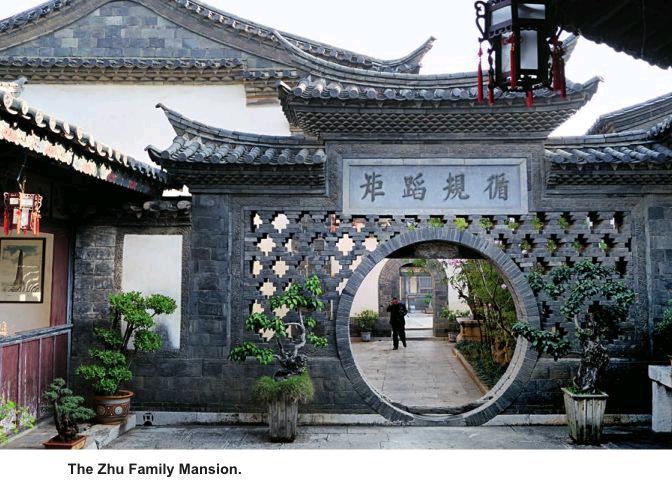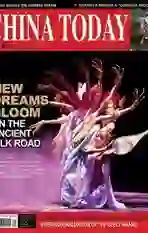Jianshui,a Historical Haven
2014-02-13
JIANSHUI Old Town is famous for its abundant historical and cultural attractions: remarkable ancient temples, ubiquitous ancient wells, countless exquisite old residences, and manifold delicacies. Its no wonder that, the moment I set foot in this ancient town in Honghe Hani and Yi Autonomous Prefecture, Yunnan Province, I was totally captivated by its charms.
City of “Water” sans Water
Cities known for their waters, such as Hangzhou, Nanjing and Venice, all exude touches of romance and easily evoke tender emotions. The name “Jian- shui” naturally gave me the sense of a city built beside a river – for shui means water in Chinese. I became so excited that I decided to see Jianshui for myself. However, arriving at the old town, I found no such river – yet still discovered a charming town, with the serenity of a hermit, beckoning exploration.
Spotting a simple inn, I hurriedly stored my luggage, and then plunged into the citys ancient alleyways. The zigzagging long alleys are crisscrossed with blue flagstone pavements worn smooth and glazed under centuries of wear. Traditional old houses line the alleys, subtly revealing local peoples poetic qualities and penchant for culture in the engravings and paintings of natural scenery on eaves and doors, and verses and odes in different styles of calligraphy on the walls.
A light drizzle gave the little towns scenery even more clarity and charm. Strolling amid the bustling tourist throngs, I heard a line from The orchid Pavilion sung by Jay Chou in his distinctive Chinese style, “On the blue flagstone street, when you glanced back and flashed a smile, you looked so gentle and graceful.” At that moment, I became totally mesmerized by the citys beauty.
Historical Sites Everywhere
Before my departure for Jianshui, I heard this about the ancient town: within three throws of a stone a temple would appear, five stone-throws away a shrine, and two miles away stands a bridge, three miles away a tower. The statement does in- deed tally with the reality.
Undergoing the vicissitudes of 12 centuries, the ancient town still preserves over 50 ancient buildings, once known as the “Ancient Architecture Museum” and “Residences Museum.” Due to its remote location and difficult access, the town remains fairly secluded. Despite successive wars and social upheavals, numerous ancient buildings have survived, including the thatch- and bamboo-roofed houses of the Hani people, the bungalows of the Yi and the Dai people, and the tile-roofed one-storey houses of the Han.
Ancient Chinese architecture emphasized symmetry. The Jianshui Confucius Temple may be taken as an example of this ancient obsession with balance. The temple features palace architecture with a north-south axis. On its east and west sides, multiple individual buildings stand, majestic and orderly. Similar to the Qufu Confucius Temple in Shandong Province, the Jianshui Temple also houses one pool, two main halls, two side halls, two principal rooms, three pavilions, four gates, five kiosks, fi ve shrines, and eight memorial archways –all well preserved.
The Jianshui Confucius Temple Park is scenic, with pines and bamboos shading the temple complex, through the spiraling smoke of burnt incense. The temples stone carving of Confucius, reciting to the accompaniment of a string instrument, is unique. The carving, placed at the altar, commemorates Confucius lecturing his followers. Confucius sits on the ground, his thick beard drooping to his chest, seeming to chant or sing in sedate tones. His disciples, all wearing loose robes and hemp headcloth, sit on his either side listening, with extreme reverence, to Confucius teachings.
Ubiquitous Ancient Wells
Old wells are scattered across Jianshuis ancient alleys.
According to historical records, the oldest in Jianshui is the Liquan Well outside the east city gate, with a history of over 700 years. A 60-cmhigh balustrade encircles the round well with a 90-cm-diameter opening. Two arcs formed by huge boulders shape a cylindrical edge around the well opening. Molten pig iron was poured into the grooves at the brims of the two arcs to fuse them securely.
The most famous well here would be the Daban Well, also known as the Pubo Well, boasting the biggest opening – more than three meters in diameter. Beside the well stands a temple where the Water Deity is worshipped. The well water is clear and soft. Tea made with it has a sweet taste, and tofu, such as the famous West Gate Tofu, made with the water is tender and delicious.
Other wells in the old town include Dragon Well, Red Well, Zhuge Well, Yonglian Well, and Yongning Well. Some have one opening, while others have two, three or four, a feature rarely seen in other places.
With these innumerable wells, Jianshui people have retained the towns ancient and traditional lifestyle. To enjoy a cup of tea, water from the West Gate Well is boiled in a copper kettle. Otherwise, residents would not deem the tea satisfying.
Jianshuis braised tofu enjoys a fi ne reputation, again ascribed perhaps to the excellent water used in making it. On old West Gate Street, the aroma of braised tofu wafts out through open wooden doors. Snack bars in Jianshui mainly sell foods made with tofu. Snacks famous in other parts of Yunnan, like rice noodles, are only side dishes here for braised tofu. Visitors from far and near usually enjoy a meal of braised tofu before leaving. This is the greatest delicacy.
Jianshui peoples love of wells is not only evident in the platforms erected to protect the wells, and ditches nearby to discharge wastewater, but also in keeping the well water clean, and not using bad language near a well.
Zhu Family Mansion
This is a private compound in southwestern frontier.
In ancient times, Yunnan was underdeveloped in terms of economy and culture due to its remoteness from Chinas political and economic center. So its truly amazing to find such a big mansion with a style and grandeur even rivaling more famous counterparts in Suzhou and Hangzhou. Moreover, stories about this mansion are also myriad.
Lets start with the history of the Zhu family. During the reign of Emperor Hongwu (1368-1398) in the Ming Dynasty, the Zhu ancestors migrated to Jianshui from Mayang County in Hunan Province. In the Emperor Tongzhi era (1862-1875) during the Qing Dynasty, Zhu Guangfu, then head of the family, began to buy land to build a residence and establish a distillery. From then on, the family began to fl ourish and expand. At that time, the tin industry in Gejiu south of Jianshui was booming. Taking advantage of the boom, the Zhu family raised funds to establish the company called “Zhuhengtai.” With business also expanding, they came to be known in southern Yunnan for tin mining, ore dressing and smelting. Meanwhile, some of the Zhu family descendants became juren (formerly, second-degree candidates in the provincial imperial examinations) and jinshi (formerly, third-degree candidates in the highest imperial exams) in succession, and launched official careers. The Zhu family soon became distinguished in the south and perhaps throughout Yunnan, with their businesses spanning farming, industry and commerce. It was therefore inevitable that the family built this large and magnifi cent mansion.
The entire mansion encompasses over 40 courtyards and over 200 rooms, all in an orderly layout. The 10 stilted buildings to the left of the main entrance facing the street hold the accounting house, and the venue to receive and distribute goods and materials – a crucial location for the familys economic activity. To its right sits the Zhu clans ancestral hall. The exquisite pool in front of the hall is evidence of the privilege enjoyed by this large feudal family, with a theater over the water, and flowers and trees interspersed around pavilions. The scene fascinates visitors with its vibrant evocation of the familys past offering ceremonies and entertainments. At the photo exhibition in the mansion, you may spot a slip of paper left by a lady of the family when learning poetry. With her teachers red correction marks still on it, the faded slip shows clearly the ladys graceful handwriting.
Despite its power and prosperity, the Zhu family was unable to avoid its fate. In the fi rst half of the 20th century, during cycles of wars and chaos, elite family members were executed, imprisoned, or fl ed into exile. After that, the family declined, only leaving this dazzling residence to posterity.
Compared to other ancient towns also enjoying a long history and maintaining ancient buildings, such as Lijiang and Dali full of jostling tourists, Jianshui has luckily escaped their uproar and pomp, while preserving an abundance of traditional customs and historical sites. The tranquil charm appeals to visitors, making them linger, unwilling to leave.
